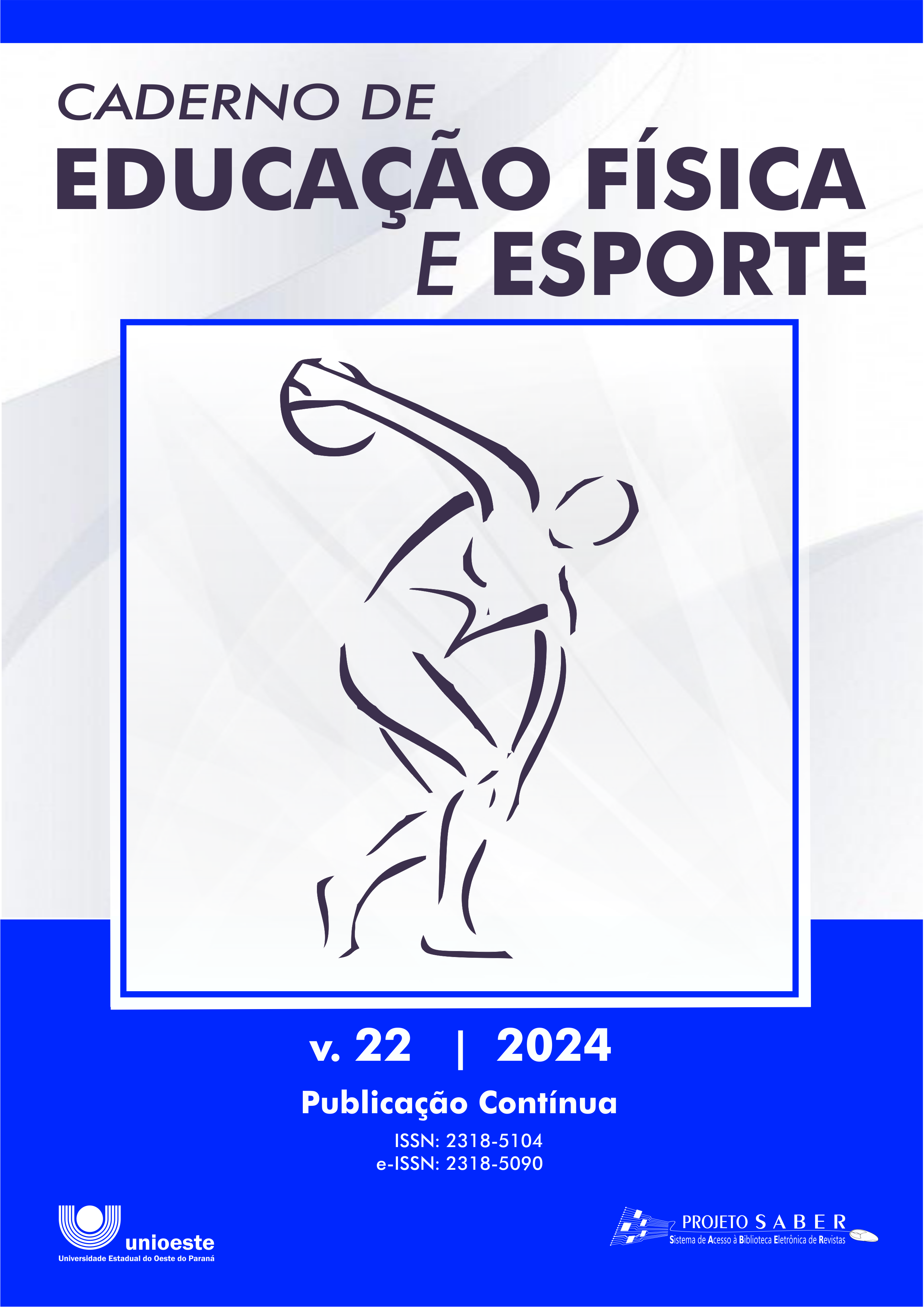Prática de natação e hidroginástica: relações com o bem-estar subjetivo
DOI:
https://doi.org/10.36453/cefe.2024.33605Palavras-chave:
Atividades Aquáticas, Saúde Mental, PsicologiaResumo
OBJETIVO: O objetivo do estudo foi analisar os efeitos da prática de natação e hidroginástica na percepção do bem-estar subjetivo em adultos.
MÉTODOS: A presente investigação caracterizou-se por ser de tipo descritivo e exploratório com enfoque quantitativo. Os participantes foram 73 praticantes de natação ou hidroginástica de um projeto de extensão da Universidade Estadual do Oeste do Paraná (Unioeste). Os instrumentos da pesquisa foram: um questionário sociodemográfico, a Escala Positive and Negative Affect Schedule versão reduzida Portuguesa (PANAS-VRP), para medir os afetos positivos e negativos (dimensão afetiva do bem-estar) e a Escala de Satisfação de Vida para avaliar o bem-estar desde a dimensão cognitiva. Todas as variáveis do estudo foram analisadas de forma descritiva por meio de frequência absoluta e relativa e uma estatística inferencial para investigar possíveis diferenças entre o bem-estar psicológico e as características sociodemográficas da amostra. Destaca-se que todas as análises adotaram um intervalo de confiança de 95%.
RESULTADOS: Os resultados evidenciaram que no geral os participantes tiveram níveis entre moderados e altos de comportamentos positivos (Positivo=3,8; 3,4-4,4). Além disso, os indivíduos descreveram que estão entre nada ou um pouco com comportamentos negativos (Negativo=1,6; 1,2-2,30) e no geral descreveram que estão satisfeitos (Satisfação=27; 24-30). Quando avaliados os afetos considerando a faixa etária observou-se que os praticantes mais velhos apresentaram maior índice de afeto negativo quando comparado aos praticantes mais jovens de até 50 anos (p=0,005).
CONCLUSAO: Por fim, conclui-se que a prática de natação e hidroginástica podem colaborar na percepção do bem-estar psicológico dos indivíduos, pelo qual a promoção destas atividades entre a população adulta merece mais iniciativas de estudo e de políticas públicas e/ou privadas que ampliem à oferta destas modalidades para a população.
Downloads
Referências
CARNEIRO, C. P. R. O bem-estar subjetivo e a prática de exercício físico nos idosos: Um estudo com dois tipos de treino. Dissertação (Mestrado em Educação Física) - Universidade do Porto, Porto, 2017. Disponível em: https://repositorio-aberto.up.pt/handle/10216/105990.
CORREA, C. R. F.; MASSAUD, M.G. Natação para adultos. Rio de Janeiro: Sprint, 2004.
DIENER, E; EMMONS, R.A.; LARSEN, R. K.; GRIFFIN, S. The Satisfaction with Life Scale. Journal of Personality Assessment, v. 49, n. 1, p. 71-75, 1985. DOI: https://doi.org/10.1207/s15327752jpa4901_13.
FURTADO G. E. Autopercepções, bem-estar subjetivo exercício físico em adultos: “Efeitos de um programa de exercício físico em indivíduos praticantes da cidade de Belo Horizonte (MG) - Brasil”. Dissertação (Mestrado em Educação Física) - Faculdade de Ciências do Desporto e Educação Física da Universidade, Coimbra, 2011. Disponível em: https://www.proquest.com/openview/eaba5654808708ecc2c04e8e83a21858/1?pq-origsite=gscholar&cbl=2026366&diss=y.
GALINHA, I.; RIBEIRO, J. L. P. História e Evolução do Conceito de Bem-Estar Subjetivo. Psicologia, Saúde & Doenças, v. 6, n. 2, p. 203-214, 2005. Disponível em: https://www.redalyc.org/pdf/362/36260208.pdf.
GALINHA, I. C.; PEREIRA, C. R.; ESTEVES, F. Versão Reduzida da Escala Portuguesa de Afeto Positivo e Negativo – PANAS - VRP: Análise fatorial confirmatória e invariância temporal. Psicologia, Saúde & Doenças, v. 28, n. 1, p. 53‐65, 2014. DOI: https://doi.org/10.17575/rpsicol.v28i1.622.
GIACOMONI, C. H. Bem-estar subjetivo: em busca da qualidade de vida. Temas em Psicologia da SBP, v. 12, n. 1, p. 43-50, 2002. Disponível em: http://pepsic.bvsalud.org/scielo.php?pid=S1413-389X2004000100005&script=sci_arttext.
GIACOMONI, C. H.; Hutz, C. S. A mensuração do bem-estar subjetivo: escala de afeto positivo e negativo e escala de satisfação de vida. Anais do XXVI Congresso Interamericano de Psicologia, São Paulo, São Paulo, Brasil, 1997. Disponível em: https://scirp.org/reference/ReferencesPapers?ReferenceID=1160105.
HADDAD, F. H. A Natação Como Fator de Promoção da Qualidade de Vida de Crianças de Dez a Doze Anos. Monografia (Especialização em Esporte Escolar), Universidade de Brasília, Brasília, 2007.
JÚNIOR, R. L. Participação em Hidroginástica, Crenças de Autoeficácia, e Satisfação com a Vida em Mulheres de 50 a 70 Anos. Dissertação (Mestrado em Educação Física), Universidade Estadual de Campinas, Campinas, 2003. Disponível em: https://repositorio.unicamp.br/acervo/detalhe/289189.
LANE, A. M.; LOVEJOY, D.J. The effects of exercise on mood chances: the moderating effect of depressed mood. Journal of Sports Medicine and Physical Fitness, v. 41, n. 4., p. 539-545, 2001. Disponível em: https://citeseerx.ist.psu.edu/document?repid=rep1&type=pdf&doi=e2247c72e4d0b4c7e6b4d421768f6227122ec3d6.
MACHADO, B. R.; RUFFEIL, R. Natação e o Desenvolvimento em Crianças de Dois a Seis Anos de Idade, Monografia (Conclusão de Curso em Educação Física), Universidade do Estado do Pará, Belém, 2011. Disponível em: https://paginas.uepa.br/ccbs/edfisica/files/2011.2/BRUNO_MACHADO.pdf.
MARTINHO, U. G. Efeitos do Treinamento e Competição no Bem-Estar Subjetivo, Autoestima, Estado de Humor, Ansiedade Físico Social e Busca Pela Musculatura em Nadadores Brasileiros de Alto Nível. Tese (Doutorado em Educação Física), Universidade Estadual de Campinas, Campinas, 2015. Disponível em: https://paginas.uepa.br/ccbs/edfisica/files/2011.2/BRUNO_MACHADO.pdf.
PASSARELLI, P. M.; SILVA, J. A. Da. Psicologia Positiva e o Estudo do Bem-Estar Subjetivo. Estudos de Psicologia, v. 24, n. 4, p. 513-517, 2007. DOI: https://doi.org/10.1590/S0103-166X2007000400010.
PAÚL, C. Envelhecimento ativo. Porto: Rediteia, 2012.
PETRY, G. J. Natação e Bem-Estar Subjetivo. Monografia (Conclusão de Curso em Educação Física), Universidade Tecnológica Federal do Paraná, Curitiba, 2018. Disponível em: https://www.studocu.com/pt-br/document/anhanguera-educational/educacao-fisica/natacao-e-bem-estar-subjetivo/36175923.
SORIANO, R. R. Manual de pesquisa social. Petrópolis: Vozes, 2004.
SCORSOLINI-COMIN, F.; FOITAINE, A. M. G. V.; BARROSO, S. M.; SANTOS, M. A. Fatores associados ao Bem-Estar Subjetivo em pessoas casadas e solteiras. Estudos de Psicologia, v. 33, n. 2, p. 313-324, 2016. DOI: https://doi.org/10.1590/1982-02752016000200013.
SIQUEIRA, M. M. M; Padovam, V. A. R. Bases Teóricas do Bem-Estar Subjetivo, Bem-Estar Psicológico e Bem-Estar no Trabalho. Psicologia: Teoria e Pesquisa, v. 24, n. 2, p. 201-209, 2008. DOI: https://doi.org/10.1590/S0102-37722008000200010.
Publicado
Como Citar
Edição
Seção
Licença
Copyright (c) 2024 Direitos Autorais Partilhados

Este trabalho está licenciado sob uma licença Creative Commons Attribution-NonCommercial-ShareAlike 4.0 International License.
Os direitos autorais permitem descarregar, compartilhar, copiar, distribuir, adaptar, transformar, exibir, reproduzir a totalidade ou partes do artigo para qualquer propósito legal, desde que não tenha fins lucrativos e seja citada a fonte.
Informamos que todo o conteúdo do texto publicado, e dos seus possíveis erros ortográficos e gramaticais, é de inteira responsabilidade de seus autores, não cabendo ao Caderno de Educação Física e Esporte, ou aos nossos Avaliadores Ad Hoc, por qualquer implicação legal ou por eventual negligência à língua portuguesa ou à estrangeira.






















